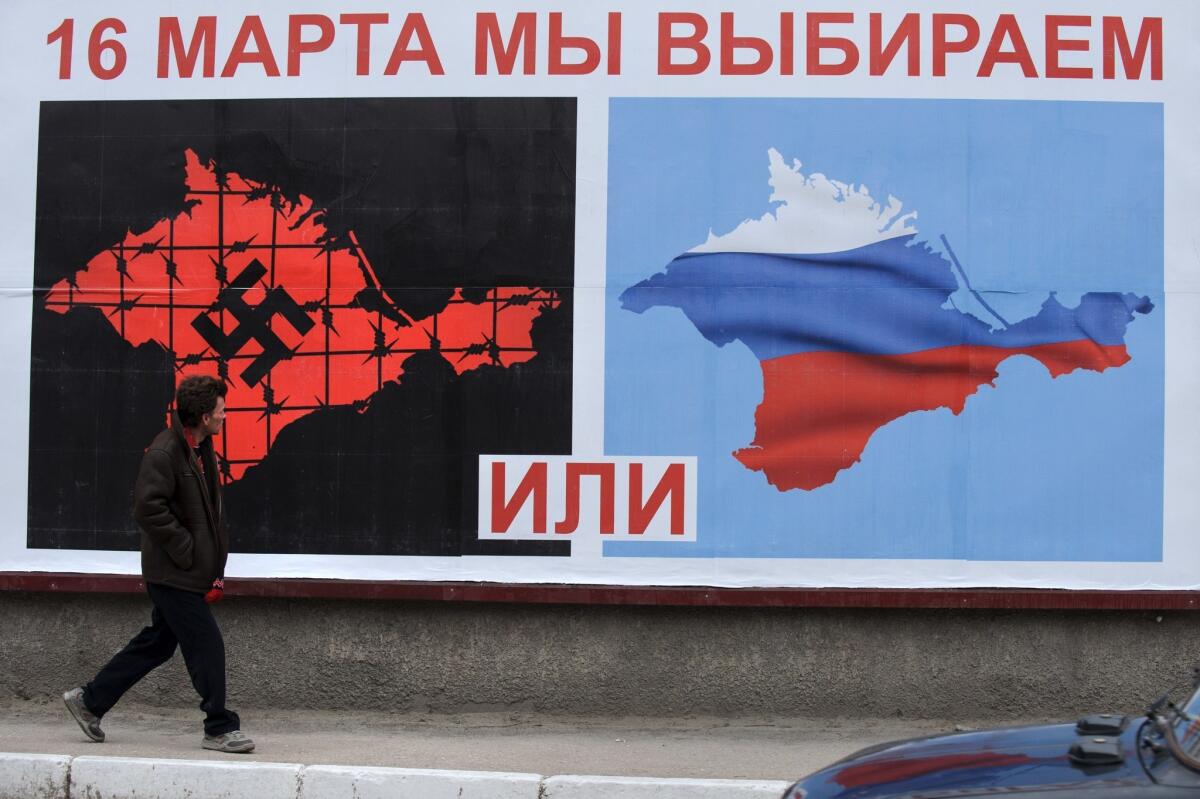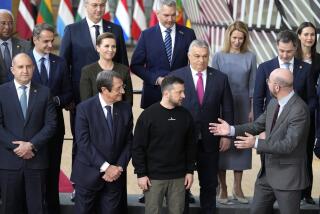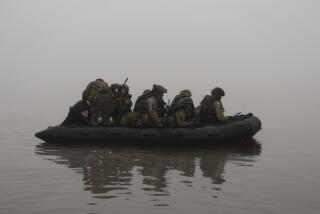Crimea bars ‘nationalists’ from secession vote; EU warns of sanctions

Crimea’s Russian-controlled parliament voted Tuesday to bar what it considers “nationalist political organizations” involved in the recent leadership turmoil in Kiev from taking part in Sunday’s vote on whether to separate from Ukraine and become an independent country with aspirations of joining Russia, the RIA Novosti news agency reported.
The legislation passed by lawmakers whose assembly has been under the control of Russian gunmen for nearly two weeks specified two nationalist parties, Svoboda and Right Sector, but also authorized security forces to detain and prosecute “anyone suspected of inciting ethnic hatred and calling for violence.”
Russian President Vladimir Putin and Kremlin-controlled media have cast the three-month protest that drove ex-Ukrainian President Viktor Yanukovich to flee the country on Feb. 21 as an illegal overthrow by “fascists” and “criminals.”
The Crimean region’s Moscow-installed premier, Sergei Aksenov, has echoed that line in calling for the referendum, contending that ethnic Russians and Russian speakers who make up a majority of Crimea’s 2 million people are threatened under the new interim government that replaced Yanukovich in Kiev, the Ukrainian capital.
It was unclear how Crimean authorities planned to identify and disenfranchise those who will be ineligible to vote on the future of the Ukrainian region that hosts Russia’s Black Sea fleet and its only warm-water ports.
Thousands of pro-Russia demonstrators have turned out for rallies in support of seceding from Ukraine, and Western news agency video images have captured security forces pouncing on the few protesters attempting to display Ukraine’s blue-and-yellow flag or placards professing loyalty to the government in Kiev.
Yanukovich appeared Tuesday on Russian television to warn that the former opposition figures now running the government in Kiev are backing right-wing forces that threaten to unleash civil war in Ukraine.
“They want to put the [Ukrainian] army under a flag of [nationalism] and unleash a civil war,” Yanukovich said in the appearance from Rostov-on-Don in southern Russia, near the border with Ukraine. “They want to include fighters from nationalist organizations in the armed forces and hand them guns.”
Yanukovich declared himself the legitimate president of Ukraine and has been backed by Russia to the extent that his ouster at the culmination of massive disorder in Kiev serves the Kremlin’s narrative that Ukraine’s interim leadership is illegitimate. But Yanukovich was hardly more popular in the Russian-oriented eastern and southern areas of Ukraine than in the capital and other European-leaning cities like Lviv and Ivano-Frankivsk.
Ukraine’s acting president, Oleksandr Turchynov, announced Tuesday that the country was organizing a national guard force of 20,000 and mobilizing all active-duty soldiers and reservists “to protect the country and citizens against all criminals, external and internal aggression.”
The United States and European Union have warned Russia against carrying out the Crimean referendum on secession, which international legal experts say violates Ukraine’s Constitution and international law in hijacking decisions on the control of national territory and borders, an authority that rests with the country as a whole.
Some of Crimea’s new Russian-allied leaders revised their position on their post-referendum plans Tuesday, saying that a majority vote in favor of the secession initiative would make Crimea an independent country. They had earlier said the vote would lead to reunion with Russia.
But their long-term intent is clearly to rejoin Russia, which ruled Crimea for centuries before Soviet leader Nikita Khrushchev made the territory part of Ukraine in 1954. That was a move of little strategic consequence until the 1991 breakup of the Soviet Union marooned Russia’s naval fleet in what is now part of independent Ukraine.
The rewording of the referendum question to seek voter approval for “declaration of independence of the Autonomous Republic of Crimea” may have been done under pressure from Moscow, if the Western threats of economic sanctions are giving the Kremlin pause to reflect on the potential losses that could be incurred for openly encouraging the annexation of another country’s territory.
“Having adopted the declaration, we will have voiced ourselves as a republic, and as a republic we will be joining Russia,” the Interfax news agency quoted Crimean parliament Speaker Vladimir Konstantinov as saying.
The European Union has threatened economic sanctions against Russia if it persists in supporting the Sunday referendum and welcoming the breakaway region of Ukraine into its territory. German Foreign Minister Frank-Walter Steinmeier gave Moscow an ultimatum on Tuesday that it faces trade, travel and economic sanctions unless it moves to de-escalate the Crimean conflict.
“We continue to urge Russia to use the last possibilities that are still there for a diplomatic solution against such an escalation,” Steinmeier told reporters during a visit to the Estonian capital, Tallinn. “Otherwise, relations between Europe and Russia won’t improve.”
Twitter: @cjwilliamslat
More to Read
Start your day right
Sign up for Essential California for news, features and recommendations from the L.A. Times and beyond in your inbox six days a week.
You may occasionally receive promotional content from the Los Angeles Times.






